Washington DC: The ongoing complexities of the Syrian conflict took center stage during a Pentagon press briefing when The Frontier Post posed a pointed question to Pentagon Press Secretary, Brigadier General Patrick Ryder. The question addressed the possibility of Russia and Iran targeting U.S. soldiers in Syria and Iraq, much like allegations of Russia paying bounties to the Taliban to target American forces during the Afghanistan war.
The query emphasized the increasing seriousness of the Syrian conflict and challenged the U.S. position by highlighting the risks posed by other major players in the region, specifically Russia and Iran. General Ryder reiterated the U.S. mission in Syria, stating, "Our purpose in Syria remains to defeat ISIS and ensure they cannot reemerge as a threat to the region or the world." He avoided direct speculation on the motives or strategies of Russia and Iran but acknowledged the dangers inherent in the region.
The Frontier Post's question points to the shifting dynamics in Syria, where multiple powers -- including the United States, Russia, and Iran -- have vested interests. The U.S. maintains a limited military presence in Syria, primarily focused on combating ISIS, but its operations have faced growing scrutiny. Critics argue that these missions leave U.S. personnel vulnerable to broader geopolitical maneuvers by adversaries like Russia and Iran.
Past accusations, including claims of Russian bounties on U.S. troops in Afghanistan, have fueled concerns about indirect attacks orchestrated by adversarial nations. If such tactics were to be employed in Syria or Iraq, it could escalate tensions and further complicate an already fragile situation in the Middle East.
"While we remain committed to our mission against ISIS," military analysts suggest that "it must also navigate larger geopolitical rivalry."
This involves maintaining strong intelligence capabilities, building regional alliances, and keeping diplomatic channels open to avoid unintended escalations.
For Russia and Iran, their roles in Syria extend beyond military strategy encompassing broader geopolitical objectives. Russia supports Assad's regime to cement its influence in the Middle East while Iran views its presence as critical for countering U.S. influence securing its regional goals.
"The Frontier Post's question reflects a broader debate about U.S foreign policy," emphasizing "the efficacy risks of presence especially facing adversarial actions."
While Pentagon remains steadfast focusing on ISIS this exchange underscores need for comprehensive approach addressing multi-dimensional challenges posed by regional global adversaries.
